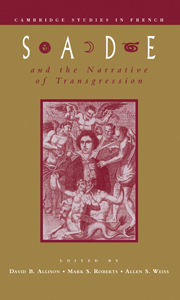Book contents
- Frontmatter
- Contents
- List of contributors
- Acknowledgments
- Introduction
- 1 The use value of D. A. F. Sade (An open letter to my current comrades)
- 2 Sade, or the philosopher–villain
- 3 Libidinal economy in Sade and Klossowski
- 4 A political minimalist
- 5 The Society of the Friends of Crime
- 6 Sade, mothers, and other women
- 7 The encyclopedia of excess
- 8 “Sex,” or, the misfortunes of literature
- 9 Structures of exchange, acts of transgression
- 10 Gender and narrative possibilities
- 11 Sade's literary space
- 12 Fantasizing Juliette
- Select bibliography
- Index
- Cambridge Studies in French
7 - The encyclopedia of excess
Published online by Cambridge University Press: 21 August 2009
- Frontmatter
- Contents
- List of contributors
- Acknowledgments
- Introduction
- 1 The use value of D. A. F. Sade (An open letter to my current comrades)
- 2 Sade, or the philosopher–villain
- 3 Libidinal economy in Sade and Klossowski
- 4 A political minimalist
- 5 The Society of the Friends of Crime
- 6 Sade, mothers, and other women
- 7 The encyclopedia of excess
- 8 “Sex,” or, the misfortunes of literature
- 9 Structures of exchange, acts of transgression
- 10 Gender and narrative possibilities
- 11 Sade's literary space
- 12 Fantasizing Juliette
- Select bibliography
- Index
- Cambridge Studies in French
Summary
If we hadn't said everything, analyzed everything, how would you want us to be able to find out what is suitable for you?
The 120 Days of SodomViolence bears within itself this dishevelled negation, which puts an end to all possibility of discourse.
(Georges Bataille, L'Erotisme)THE ALL AND THE TOO MUCH
“To say everything” is the sign of a great audaciousness, an apparently boundless program, which Sadean discourse deems indispensable and definitive. This formula is disarmingly simple, yet nothing is more paradoxical if we pay close attention to it. In effect, two contradictory connotations are intermingled here: (a) that of totality: “to say everything” is the encyclopedic project of the circuit of signifiers, the collection of givens, the accumulation of arguments. In short, for this first point of view, “to say everything” would be the exhaustive and monumental task of literally saying everything, i.e. the Hegelian ambition; (b) that of excess. In this case, “to say everything” would be the demand to hide nothing, to uncover everything, in the sense of the claim (sometimes the threat), “I'm going to tell everything …”; or else it is the complicity between the Sadean character and his interlocutors, when he proposes to tell them the tale of his crimes: “I sense that I can tell you everything.” The formula is that of breaking into, of lifting, censorship, bringing the repressed to light. “To say everything” is literally the Freudian formula, the fundamental rule of psychoanalysis as a technique for recognizing and avowing desire.
- Type
- Chapter
- Information
- Sade and the Narrative of Transgression , pp. 142 - 170Publisher: Cambridge University PressPrint publication year: 1995



